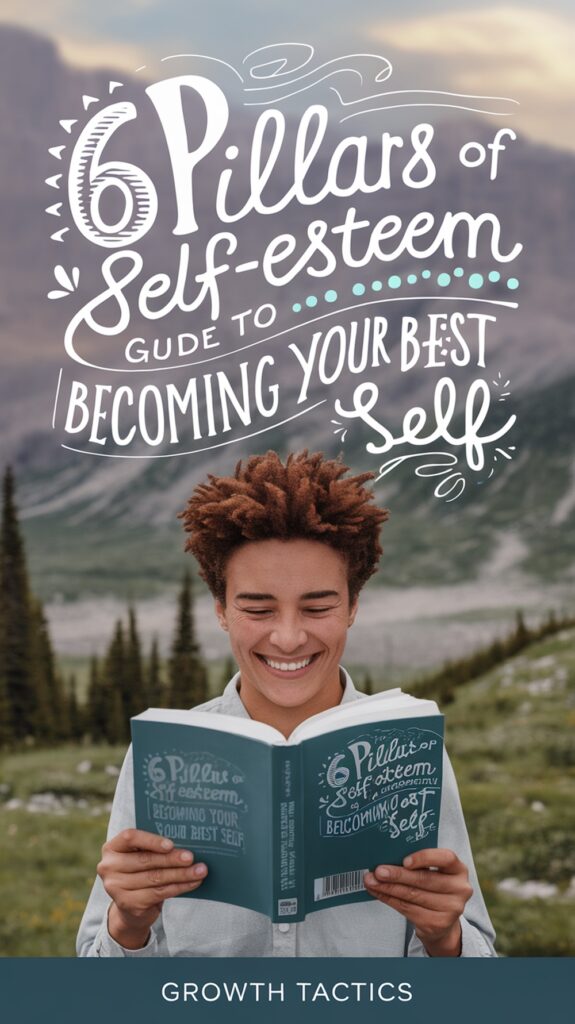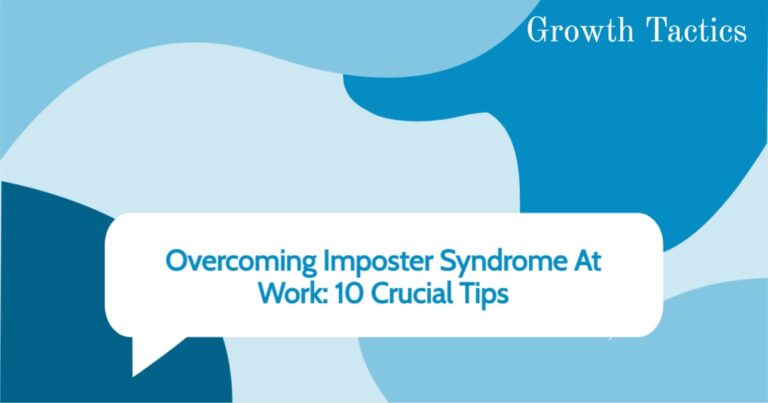Do you want to be your best, happiest self?
The 6 pillars of self-esteem are six areas that truly empower individuals to boost their self-worth. These personal development pillars are based on the work of Dr. Nathaniel Branden.
They are: living consciously, self-acceptance, self-responsibility, self-assertiveness, living purposefully, and personal integrity.
In this article, we’ll get into each pillar and share some tips that you can incorporate into your life.
Jump To Section
What is Self-Esteem?

Self-esteem is how much a person feels their life has worth or value. Self-esteem represents how much you value and respect yourself. It’s not about always feeling great about yourself, but rather finding a healthy balance of self-esteem that builds motivation, mental health, and life satisfaction.
It is the very foundation of our identity. Our self-esteem determines how we relate to everybody, be it on the job, establishing partnerships, or parenting.
More Than Just Feeling Good
Whereas moods can change in the moment, self-esteem is constant and cultivated over the years. It’s that calm voice within that tells you, “I got this,” when challenges arise.
People who have self-esteem tend to be more resilient in the face of failure. They establish their purpose and vision and follow through on them, through thick and thin.
Strong self-esteem means meeting challenges with determination, secure in the knowledge that one’s worth does not disappear in the presence of failure.
Unpacking the 6 Pillars of Self-Esteem

The six pillars of self-esteem provide a powerful foundation for long-term health and happiness. Together, these six pillars assist individuals in developing self-confidence and self-worth.
These pillars are interconnected, which means that when you improve in one area, you’re usually improving in another. Here’s a deeper look at what each pillar entails and its importance.
1. Living Consciously: Your Inner Awareness
Living consciously involves being aware of your inner self. People who engage in mindfulness become more aware of how their everyday decisions create their realities.
Spend just a few minutes each morning to tune in to your emotional and mental state. This easy habit will allow you to react to stressors more effectively and choose to stay centered.
2. Self-Acceptance: Embracing Your Full Self
Self-acceptance involves recognizing your strengths and weaknesses as a full picture of your identity. It’s okay to make mistakes or not measure up on occasion.
When you mess up, using gentle language with yourself creates more resilient self-esteem. This practice combats harmful negative self-talk and allows you to feel more at ease within yourself.
3. Self-Responsibility: Owning Your Journey
This pillar is an exercise in self-empowerment and accountability. Taking responsibility for your actions, positive or negative, opens the door to personal growth.
Many of us don’t realize how much our self-esteem takes a hit from not realizing all the positive actions we make. A lot of times, we’re too focused on the negatives. Taking responsibility for both is a game-changer in your personal growth.
4. Self-Assertiveness: Finding Your Authentic Voice
Being assertive is about expressing yourself and your needs openly and honestly, while still respecting others. When people draw lines and demand to be treated better or seek help when needed, that’s self-assertiveness in action.
This fosters trust and respect from others and, most importantly, yourself.
5. Living Purposefully: Your “Why” Power
Living with purpose starts with identifying your values and priorities. People who pursue goals connected to their core values, such as volunteering or developing a new ability, are more motivated and satisfied.
Taking regular stock of your progress helps ensure your purpose stays on your mind.
6. Personal Integrity: Actions Aligned with Values
Personal integrity is about aligning your behavior with your personal values. When your actions align with your values, you feel proud, sincere, and true to yourself.
Examining your behaviors and being ready to make incremental changes allows you to maintain alignment between your life and your values.
Building Your Pillars For Greater Self-Esteem

Like any skill, regular practice is essential. Small, daily efforts show big results over time. Whether it’s writing down changes in your mood or tracking progress in a different way, recording progress keeps you motivated and accountable on your path.
Conscious Living: Daily Mindful Moments
Focusing on the present moment creates a foundation for healing. Mindfulness practices, whether a five-minute breathing exercise after lunch or a walking meditation along the beach, help center your mind. Taking just a few minutes for self-reflection, perhaps while enjoying your morning coffee, allows you to tune into yourself.
Journaling is easy to implement, as well. Think of three things you observed about your day or how you reacted when things got hard. Write it down to be more mindful and aware.
Self-Acceptance: Beyond Surface Positivity
Self-acceptance, the second pillar, is about embracing who you are. Introspection is a great way to start figuring out just what those “bad” things you think about yourself are. Accepting negative traits, such as being stubborn or overly anxious, reminds you that no one is perfect. Everyone is a work in progress.
Practices that deepen self-love uplift you. For example, saying something you like about yourself out loud daily or reminding yourself of previous accomplishments can make acceptance a much more automatic process.
Responsibility: Your Life, Your Captaincy
The third pillar, responsibility, is about taking ownership of your life. Every time you fix a problem at work or home, you develop confidence in your abilities. You are going to make mistakes. Learning from those mistakes rather than pointing fingers gets you further ahead.
Assertiveness: Speak Up, Respectfully
Being assertive is about communicating what you want and need in an honest, direct, respectful manner. Practice asserting yourself in low-stakes situations first, such as choosing where to eat with a group of friends. Confidence earned by practicing in low-stakes environments translates to real-world success.
It’s equally crucial to value what others communicate, even if you don’t change your position.
Purpose: Small Steps, Big Meaning
When your daily actions are aligned with a long-term purpose, life becomes much more fulfilling and meaningful. For example, if you decide that your purpose is to care for your family, every little thing you do, like cooking dinner, helping with homework, or planning fun family outings, can bring you joy and satisfaction. You start to see how those small actions contribute to a bigger picture of love and support.
When you connect your everyday actions to a bigger goal, it creates a sense of direction in your life. You feel more energized and motivated to tackle challenges, knowing that you are working towards something important to you. Plus, when you see progress, it can really uplift your self-esteem, making you feel proud of who you are and what you can achieve.
Integrity: Your Personal Honor Code
Integrity is simply being clear about what you believe in. List your core values, such as integrity, compassion, etc., and hold yourself accountable daily. When you behave under those values, you create a deep, abiding sense of trust in yourself.
Being truthful, especially when difficult, is crucial for maintaining your self-esteem.
How the Pillars Boost Each Other
Each of the six pillars of self-esteem builds on the others. Each pillar not only holds you up, they help hold up the other pillars, creating a more resilient and robust sense of self. When one increases, the others are likely to increase as well. This connection between the pillars is what makes self-esteem so impactful. If you start to improve one, you may notice positive changes across multiple pillars and different aspects of your life.
Real Impact on Your Well-being
Healthy self-esteem gives your mental health a significant advantage. Those who have a strong sense of self-worth experience lower levels of stress and recover from adversity more quickly. High self-esteem is key to establishing healthy bonds with others as well.
When to Get Expert Support
If self-doubt lingers, consider seeking professional support from a counselor or therapist. If you’re experiencing feelings of worthlessness, hopelessness, or sadness nearly every day, the time has come to seek treatment.
Therapy can provide people with new tools, renewed hope, and a supportive environment to speak openly. It’s a wise move toward establishing authentic self-esteem.
Self-Esteem in Our Digital World
The impact of social media on self-esteem is an impact that researchers are only beginning to understand. People across the country live much of their lives online these days.
This allows them to belong, but creates more comparison and self-doubt. Mindful tech use, whether that’s taking breaks, setting limits, or curating positive feeds, can go a long way to protecting and building self-worth.
Continuing to foster healthy digital spaces, both at home and within the community, further protects self-esteem.
Conclusion
The truth is, self-esteem develops through tiny, consistent steps. The six pillars provide a firm foundation. Each time you advocate for yourself or listen to your intuition, you place one more brick in your confidence.
Choose one pillar to work on this week and watch your self-esteem soar.








